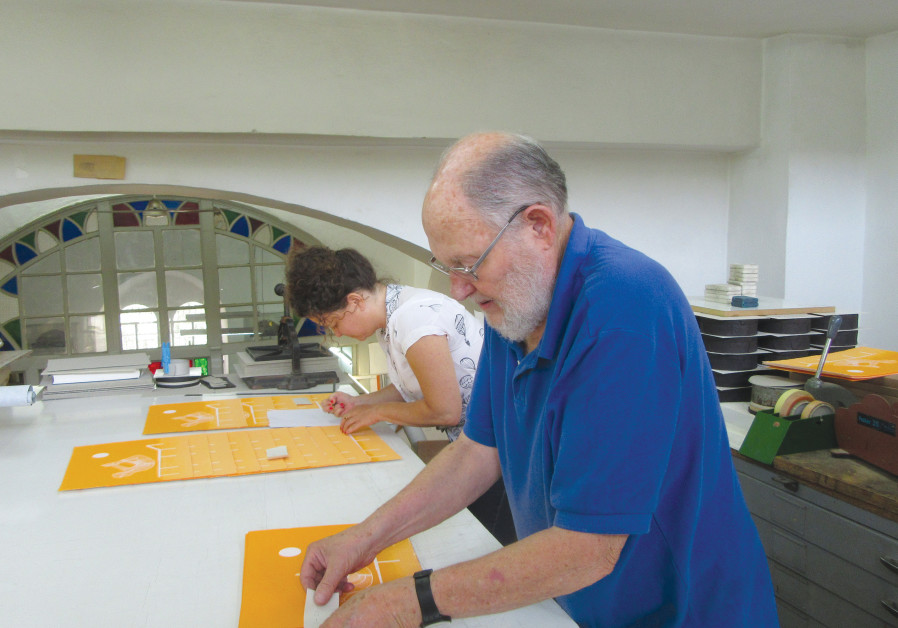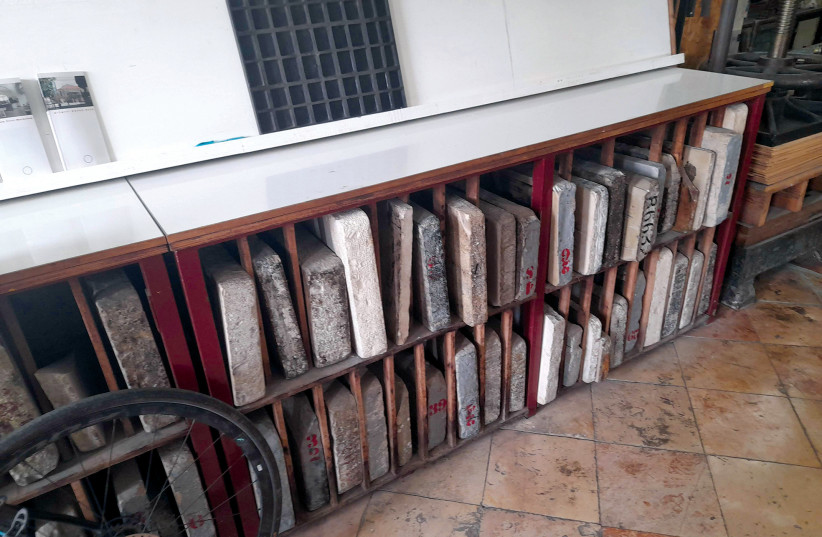
Jerusalem never fails to amaze. Just when you think you’ve got some sort of handle on a slew of urban nooks and crannies another one comes along and knocks you sideways. As I stepped into the Jerusalem Print Workshop towards the eastern end of Hanevi'im Street I could hear, smell, feel and see the waves of local history crash over me.
For starters, the building itself has been around for over a century and a half. Granted, that isn’t a huge slice of time given that Jerusalem has been with us for over three millennia. But, in the context of Israel and the chronological lead up to that momentous regional development, that is a mightily impressive vintage.
As you step into the second floor of the Ottoman building you feel as if you are entering an Aladdin’s cave scenario. Flagstones that have seen the underside of footwear of all cultural, socioeconomic and manufacturing technology ilks, since the mid-1800s, still provide the solid underpinning for fruitful enterprise, as professionals and students alike, from Israel and around the world, work their magic on lithographs and other artwork print formats.
The place simply reeks of history. The main working area, and side rooms, are dotted with cast iron machinery that have clearly been around the block, and back, over the decades. A behemoth of a press, manufactured by the Albion company of London in 1886, looks hefty and regal in equal parts.
A crown shape sits atop the machine, and its supports are fetchingly adorned with lion’s paws. Another robust example of 19th-century hi-tech, with a plate that reads Amos Dell Orto in Monza 1854 also catches the eye.

Attention to aesthetic details is a recurring motif, across the slew of yesteryear equipment – much of which is still gainfully employed – and the architectural design with vaulted ceiling arches all over the show, arched windows and hardly a sign of modern day hi-tech gizmos around.
The workshop also enjoys a downtown berth that, were it to go on sale, would have estate agents rubbing their hands with glee. The view from the expansive windows is unparalleled. For starters, you get a new geographic perspective on the eastern end of the Old City and the Dome of the Rock.
You get a palpable sense of being on the seam between the different ethnic and sociocultural sections of the city. Looking to the west you see the ecclesiastical looking Italian Hospital, while a peek to the north reveals the back streets and laundry-festooned balconies of Mea She'arim.
Arik Kilemnik is the brains, heart and seemingly inexhaustible energy behind the whole workshop shebang. The youthful-looking 87 year old – I asked to see his ID when he told me his age – has been there from the outset and is still very much hands on. Nothing seems to move without Kilemnik’s say-so.
That said, he does not come across as the authoritative type but, at his own admission, he does not hang around. “When I set my mind to something, I don’t have second thoughts. I don’t worry if I have enough money to do it. I just go for it,” he says.
That go-get-’em attitude came into play when he established the Jerusalem Print Workshop, back in 1974. That was preceded by a seven-year sojourn in New York, where he studied and taught art, and got a better than decent handle on art printing dynamics.
KILEMNIK SAYS he returned to a mostly desolate scene in his chosen field. “I came back, had an exhibition at Jerusalem Artists House and decided I wanted to set up a print workshop here. There was almost nothing here at the time. There were just a few artists who did some printing in their home studios. But, that was basically it. It was a very poor scene back then.” It was clearly time for the tough returnee from the Big Apple to get going.
And the going was not particularly easy. Guile and stealth were the order of the day. “We started out with a workshop on Rabbi Akiva Street [off Hillel Street]. My mother gave me 5,000 liras. She said she didn’t want my father to know she saved up that sum and asked me to keep it for her.”
Kilemnik didn’t stick to the letter of his mom’s request but he did put the stash to good use. “I bought a press,” he says with a smile. The Jerusalem Print Workshop did not have a particularly glorious beginning but, at least, it got the creaking show on the road. “I rented a rundown apartment from Valero,” he explains, referencing the wealthy Sephardic family that, among its many notable achievements in this part of the world, established the first bank in Palestine. “Then I went to an Arab who made wooden tables. We got everything together without a penny to our name.”
He had the basic equipment requirements lined up, now he needed the hands to put the gear into utilitarian and, hopefully, revenue generating practice. “I took a few artists on. There was one artist who had studied in Paris. I told him he’d be a printer. And there was a young lad who came looking for work and I told him he could join in, but only on a voluntary basis. I couldn’t pay wages. I worked for a living at Bezalel [Art School].”
The master printer was clearly driven to make the venture a success, but he had to slog away round the clock to make sure everything was in place. “I contacted all sorts of galleries in Tel Aviv and told them we could print works for them,” Kilemnik recalls.
Word began to get around, and the leading artists of the day began to make the trek up Route 1. “[Israel Prize winning painter and sculptor Yigal] Tumarkin came to the workshop, and [painter] Uri Lifschitz came, and [Israel Prize laureate painter and sculptor Menashe] Kadishman came.”
It helped that Kilemnik was not exactly a newcomer to the Israeli art scene and the workshop gradually started to earn its keep. “They were all friends of mine, but it was the galleries who made for the print work. We began to make some money. I remember that, after we’d been going a year, I put up a sign that said we’d made 200 liras,” he chuckles.
Still, the workshop was far from being a thriving concern. It was a constant battle to keep the wolves at bay. “Every month Valero would put the rent up. We started out paying 100 liras a month and at the end of the year it was 1,000 liras.”
That was clearly an untenable state of affairs. It was time to up anchor and find a more struggling workshop-friendly base.
THAT SEEMED to be a distinct possibility when Jerusalem mayor Teddy Kollek extended a helping hand. “He called me and asked me what I needed, besides a sewage system,” Kilemnik says. Although initially buoyed by the municipality’s generosity Kilemnik eventually demurred. He didn’t want to be beholden to anyone. “The penny dropped. I realized I didn’t want anything from the municipality.”
The current premises duly appeared over the horizon, although it took a generous dosage of boundless enthusiasm, imagination and some downright naiveté to discern the potential the place offered. “It was a ruin. A complete mess,” Kilemnik smiles. “There was a sewing workshop here, owned by a man called Glaser. The walls were peeling, there was no toilet and there was a pungent smell of paraffin, from the heater he used. But, I was excited by the place. I knew it was what I’d been looking for.”
After a little toing and froing Mr. Glaser asked for 250,000 liras from the crumbling edifice. Kilemnik didn’t happen to have that tidy sum in his back pocket, but he came up with a miniscule starter. “I wrote him a check for 100 liras,” Kilemnik laughs. “He took it and I began giving him checks every month.” Once again some truth-bending was needed. “I told my wife my shift at Bezalel had been cut – I was making 400 liras a month there – so I could carry on paying Mr. Glaser.”
To cut a long and winding story short, the ever-resourceful workshop founder got Jerusalem mayor Mordechai Ish-Shalom on board and, together with the board members of the nonprofit he’d set up, he managed to come up with the astronomical asking price, and later secured yet another loan to cover the slice demanded by state-owned housing company Amidar.
The workshop had finally found a permanent home, protracted and costly renovation work notwithstanding. The beneficial upshot of that is evident right across the premises today.
The interior is clearly well maintained and the history-laden ambiance is enhanced by the alluring interior design and the patent dearth of state-of-the-art technology. Before he gave me the grand tour of the workshop’s three floors, we sat in a cozy basement room, most of which was taken up with library shelving and numerous times about a broad range of artistic endeavors.
The books are made available to students and others on a loan basis. The only hint of the 21st century there was a computer screen, sans computer, gathering dust on a deep alcove window sill.
Over the years, the business gained a decent head of steam, with Kilemnik’s altruistic ethos informing the place’s modus operandi. “We told artists, like Moshe Gershuni, we would print their works for free and, if we sold the prints, they would get most of the returns,” he explains.
There is always plenty to see at the workshop. When I dropped by recently, the lower level display areas sported a compelling spread of homebase-produced prints by Gershuni, an internationally acclaimed painter and sculptor who died in 2017.
The exhibition took in works that were created between 1979 and 2014, including from Gershuni’s celebrated Kaddish series – inter alia, he was known for his alternative take on the Holocaust – and other nuanced offerings relating to mourning and summations of life
But, while the past is front and center wherever you turn, the Jerusalem Print Workshop, fired by its evergreen founder, is very much a going concern and well worth a visit. ❖
For more information, visit jerusalemprintworkshop.org/en.







